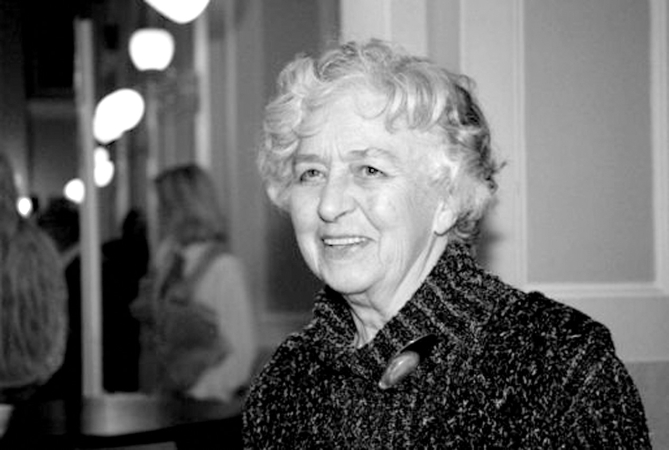
The Funny Side of Life
It is probably not necessary to introduce Věra Tichánková, but there are periods of her life which are defi nitely worth remembering.
Maybe because today’s generation hardly comprehend the era which she lived through. It is a strange feeling to meet someone who has always spread humour around her, although she experienced so much hardship in her young life.
As she says, she inherited her sense of humour from her father Antonín, who came from Lomnice nad Popelkou as well as her mother Stanislava. Her father was a clerk but his income was small. So the family often moved around to follow the work, even as far as Slovakia, where in 1920 Věra was born in the village of Žarnovická huť (Nová Baňa). The family rejoiced when the father was transferred to Brandýs. When she was in the second class they moved to Liberec, where later her sister Maria was born. When she was thirteen her father suddenly died. After this tragedy Věra, with her mother and seriously ill grandmother, moved back to Brandýs, where she completed grammar school.
As she says she did not know how to deal with her fate, because she passed her fi nal exam under Nazi occupation so at that time it was diffi cult to choose what to do next. But as friends of the family were looking for someone who understood chemistry to work in their cosmetic factory, she started studying at the Institute of Chemical Technology. In October 1939 the Nazis closed the Czech universities so she went to J. Štěpničková in Vinohrady Theatre (Prague). This was not surprising as theatre was her passion. With Anna Suchánková as her mentor she passed the entrance exam to a drama school and enrolled there. However, in 1943 she was arrested by the Gestapo for supplying food coupons to “undesirables”, organised at the drama school by V. Adámek, later-to-be Director of the Jiří Wolker Theatre and O. Musil. All three were imprisoned. Věra was interrogated at Pankrác Prison, then transported to Terezín concentration camp and near the end of the war to the Dresden Court. Here she witnessed the allied air raid, which hit the building at München Platz. She stayed in the court cells until the Americans released her. From Dresden she and others went to Leipzig on foot to a collection point, from where she was transported to Pilsen, returning home on May 28, 1945.
After the war she acted in the Horácké Theatre in Jihlava, where she met her husband, actor Jan Skopeček. He also was imprisoned in the concentration camps during the war in his case due to his mixed parentage (his mother was Jewish). Smiling, he remembers his unusual baggage of under 10 kg, which they were allowed to take. No clothes, no food, just a little Shakespeare. He thought that after work he would have time for reading. So little was then known about these camps. So Shakespeare accompanied Jan for the entire period until liberation. When he went home, he carried his books on an inexpertly made sledge, well, at least until he had to negotiate the border mountains. The steeper the hill, the more volumes of the great playwright parted company with him, until unfortunately there were none.
In 1949 Věra and Jan left Jihlava for Prague, there Jan co-founded Divadlo pod Palmovkou (Under Palmovka Theatre), where he still is today. He is an author of 6 plays and several radio dramatizations. In 1953 their only daughter Marie was born, and now she lives in Lyon. By the way, do you know why Jan says his marriage came with an observation tower? Maybe because Věra’s granddad J. Tichánek, Lomnice nad Popelkou Beautifying Society Chairman, pushed forward the construction of a 35 m brick tower on Tábor Hill, which even today is known as Tichánek’s. In 2002 Věra Tichánková received a theatrical Thálie Award for lifetime achievement and contributions to the genre.
In 2002 Věra Tichánková received the Thálie Award for lifetime achievement and contributions to the genre.
Luděk Sládek
Nesouhlas se zpracováním Vašich osobních údajů byl zaznamenán.
Váš záznam bude z databáze Vydavatelstvím KAM po Česku s.r.o. vymazán neprodleně, nejpozději však v zákonné lhůtě.